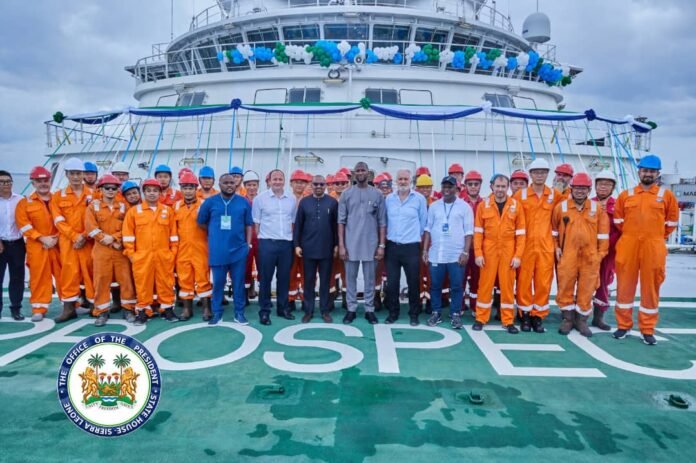Representing His Excellency President Dr Julius Maada Bio, Vice President Dr Mohamed Juldeh Jalloh has concluded a tour of the BGP Offshore Seismic Oil and Gas Exploration vessel at the Queen Elizabeth II Quay, where he was briefed on the findings, challenges, and recommendations from a major offshore survey in the country’s upstream sector.
The Vice President received the update from the Director of GeoPartners Limited, Jim Gulland, who thanked President Bio and the Petroleum Directorate for initiating the venture to explore Sierra Leone’s offshore oil and gas potential. He explained that the GPSL25 3D Seismic Geophysical Survey, covering 2,900 square kilometres, began in June 2025 and was completed in August 2025. The survey was conducted using two additional vessels, Moonrise-G and the 7 Star Vessel, to ensure efficiency and high-quality results.
Mr Gulland noted that 71 sequences were deployed, producing high-resolution data to assess the presence of oil in Sierra Leone’s waters. He stressed that the work was carried out under strict environmental safeguards, with an operating licence from the Environmental Protection Agency (EPA). The gathered data, he said, will be analysed and presented to President Bio to inform future decisions.
While highlighting successes, he also pointed out challenges faced during the exploration, including the presence of fishing aggregation devices, often linked to illegal fishing. He underscored the important role of the navy in addressing such issues to protect offshore activities.
Delivering remarks on behalf of President Bio, Vice President Jalloh commended the crew for their operations and described the findings as a significant step in Sierra Leone’s journey to energy security. “Your exploration results indicate a real opportunity for our country’s transition towards energy independence. This survey is a milestone achievement and the kind of breakthrough we have been seeking in the sector,” he said.
The Vice President emphasised that the results demonstrate Sierra Leone’s readiness for investment in the oil and gas sector. “It comes at a time when global competition for revenue is intense. When this sector commences operations, it will create jobs and generate revenue to boost our economy,” he noted. He assured that the government will act on the recommendations related to maritime security and thanked the Petroleum Directorate for overseeing the successful completion of the survey. “Energy security is at the heart of transforming our economy. Sierra Leone is ready and open for business in the energy sector,” he added.
Director General of the Petroleum Directorate, Foday Mansaray, expressed gratitude to President Bio for his leadership and for creating opportunities for young Sierra Leoneans to serve in the sector. He revealed that the survey had originally been scheduled for 2029 but was brought forward after his team convinced FA Oil to proceed earlier. GeoPartners Limited, a UK-based seismic company, was engaged for the work and subcontracted BGP Exploration, a subsidiary of China National Petroleum.
Mr Mansaray explained that several Sierra Leoneans were trained, including geophysicists and petroleum engineers, in preparation for the industry’s growth. He stated that the seismic exploration targeted Sierra Leone’s basin, believed to hold 30 billion barrels of oil, with FA Oil holding 10 billion barrels in its plots. If confirmed, he stressed, this could have a direct and transformative impact on the economy. The summary results are expected within six weeks, with the full data report anticipated in eight to twelve months.
He assured that the Directorate is fast-tracking data processing to guide decisions on drilling activities in Sierra Leone’s waters.




